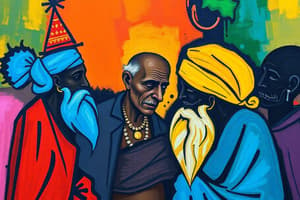Podcast
Questions and Answers
What is the most prominent faith in India?
What is the most prominent faith in India?
- Sikhism
- Buddhism
- Jainism
- Hinduism (correct)
Which major religion is known for its intricate caste system?
Which major religion is known for its intricate caste system?
- Islam
- Sikhism
- Jainism
- Hinduism (correct)
Which religious celebration is mentioned as vibrant and popular in India?
Which religious celebration is mentioned as vibrant and popular in India?
- Eid al-Fitr
- Christmas
- Ramadan
- Diwali (correct)
In Indian society, which aspect is considered a melting pot?
In Indian society, which aspect is considered a melting pot?
Which major religion follows Hinduism in terms of prominence in India?
Which major religion follows Hinduism in terms of prominence in India?
What are the four primary castes in the Indian caste system known as?
What are the four primary castes in the Indian caste system known as?
What is the term used to refer to the marginalized communities historically excluded from mainstream Indian society?
What is the term used to refer to the marginalized communities historically excluded from mainstream Indian society?
Which type of family structure is common in India where multiple generations reside together?
Which type of family structure is common in India where multiple generations reside together?
In traditional Indian society, what is the primary role assigned to women?
In traditional Indian society, what is the primary role assigned to women?
Which of these terms refers to the highest caste in the Indian caste system made up of priests?
Which of these terms refers to the highest caste in the Indian caste system made up of priests?
What is considered a cornerstone of Indian society according to the text?
What is considered a cornerstone of Indian society according to the text?
Flashcards are hidden until you start studying
Study Notes
Indian Society: An Overview of Caste, Family, Gender, Religion, and Tradition
India, a land rich with diversity, offers a complex tapestry of caste, family structure, gender roles, religion, and cultural traditions. To gain a deeper understanding of Indian society, we'll explore these interconnected facets.
Caste System
The caste system, a social hierarchy based on ancestral occupation, is a historical foundation of Indian society. The four primary castes, known as Varna, include Brahmin (priests), Kshatriya (warriors), Vaishya (traders), and Shudra (service providers). In addition, there are marginalized Dalit or Harijan communities, often referred to as "untouchables," who were historically excluded from mainstream society.
Family Structure
Indian families typically adhere to a tradition of respecting elders and protecting family honor, which extends to extended family members. Joint families, in which multiple generations reside together, are common. Marriages are often arranged, although this trend is changing with modern times.
Gender Roles
Traditional gender roles in India are rigid and hierarchical, with men seen as the primary breadwinners and women relegated to the role of homemakers. However, this dynamic is changing, as women continue to make strides in education and careers. Gender inequality remains a pressing issue, but there are encouraging signs of progress.
Religion
Religion is a cornerstone of Indian society. Hinduism, Buddhism, Jainism, Sikhism, and Islam are the major religions. Hinduism, with its ancient roots and intricate caste system, is the most prominent faith in India, followed by Islam and Sikhism. These religions shape cultural traditions, celebrations, and daily life, each with their unique practices and beliefs.
Cultural Traditions
India's rich cultural traditions include music, dance, literature, and art. The country's diverse regions host vibrant festivals throughout the year, such as Diwali, Holi, and Dussehra. These celebrations are the backdrop for cultural and religious expression, as well as opportunities for family and community bonding.
The Indian society, a melting pot of caste, family structure, gender roles, religion, and cultural traditions, is a testament to the resilience and persistence of its people. While India's past is steeped in tradition, its future is marked by gradual change and progress as the country continues to evolve with the times.
Studying That Suits You
Use AI to generate personalized quizzes and flashcards to suit your learning preferences.




